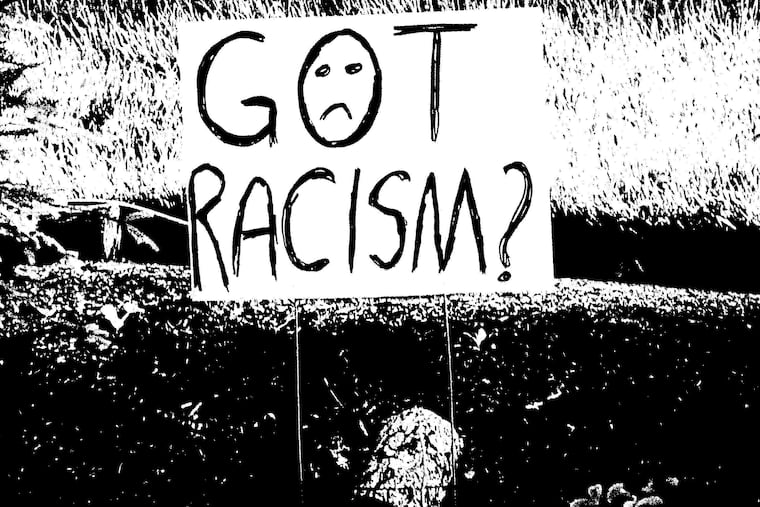A Montco family sued their neighbors over lawn signs that protested an antisemitic slur. A decade later, the Pa. Supreme Court said the signs were legal.
An Abington Township family posted nearly two dozen signs with anti-hate messages in a yearlong protest of their neighbor's use of an antisemitic slur.

A small creek and some low-lying shrub separated the properties of the Galapo and Oberholzer families in Abington Township in November 2014. Then came the antisemitic slur. And then came the signs, 23 of them.
And nearly a decade later, Pennsylvania’s Supreme Court has intervened in the neighbors’ landscaping feud-turned-protest staging ground, ruling that the Galapo family was allowed to stake dozens of antiracism lawn signs at their property line, directed at the neighbor who hurled an antisemitic slur.
Ahead of a heated election, the state Supreme Court’s ruling in the case Aug. 20 affirmed Pennsylvanians’ right under the state constitution to post lawn signs, even when their messages are targeting a specific neighbor. And it rejected one Montgomery County family’s argument that the mere presence of a sign facing their property could infringe on their ability to enjoy their home so much that a court should limit free speech.
“All homeowners at one point or another are forced to gaze upon signs they may not like on their neighbors’ property — be it ones that champion a political candidate, advocate for a cause, or simply express support or disagreement with some issue,” said Justice Kevin Dougherty, writing for the majority.
Pennsylvania’s highest court weighed in on the dispute that arose when a Jewish family, the Galapos, erected nearly two dozen lawn signs displaying anti-hate and antiracist messages on their property as part of a yearlong protest against their neighbors of German descent, the Oberholzers, after a member of that family used an antisemitic slur toward a member of the Galapo family.
The three-justice majority opinion said that it doesn’t take lightly the impact the Galapos’ lawn signs had on the Oberholzers, but that the signs alone are not enough to cause harm that requires suppressing free speech by taking them down.
Two justices — Republican Kevin Brobson and Democrat David Wecht — dissented.
Brobson said that the court had a right to prevent the Galapos from “directing their messages at the Oberholzers in a manner disrupting the quiet enjoyment of their home.”
The lawyers representing the Galapos family said they felt vindicated by the Supreme Court’s ruling, after two lower courts had ordered the family to turn around their protest signs.
“We felt all along that the Galapos posting the signs was them exercising their free speech rights,” said Andrew Kramer, who is a partner at Kane, Pugh, Knoell, Troy and Kramer.
J. Stephen Woodside, who represents the Oberholzers, did not respond to requests for comment.
Slur to signs
The bitter dispute between the Galapos and the Oberholzers began in 2014 over landscaping and resurveying of the property line.
In the midst of a heated argument, Denise Oberholzer spewed an antisemitic slur toward Simon Galapo.
Months later, the Galapos erected signs displaying anti-hate and antiracist messages facing the Oberholzer property. They posted 23 signs over a year, including: “No Place 4 Racism,” “Hitler Eichmann Racists,” “WWII: 1,500,000 children butchered: Racism,” “Got Racism?,” and “Every Racist Action Must be Met With a Sign of Defiance.”
Frederick Oberholzer, Denise’s husband, testified that when he looked out of his home’s back window or sunroom, the signs on the adjacent property were all he could see, court records show.
The couple, who are of German descent, sued their neighbors in the Montgomery County Court of Common Pleas in June 2016, alleging that the signs were a defamatory nuisance that painted their family in a false light and intentionally caused emotional distress. They asked a judge to order the Galapos to remove the signs.
“The signs are so content-incendiary as to incite hatred, ridicule and disgust,” the Oberholzers argued in their lawsuit.
A Montgomery County judge decided in 2020 that the Galapos could keep the signs on their property but in a way where the wording was not visible from the Oberholzers’ home. The Pennsylvania Superior Court largely affirmed that ruling in 2022, with some modifications.
The Galapos appealed to the state Supreme Court that summer, asking for the higher court’s approval to put the signs back up facing their neighbors.
Ordering the Galapos family to remove their yard signs could have “really opened the door to broad injunctions against speech that people simply found offensive,” said Mary Catherine Roper, who represented the American Civil Liberties Union of Pennsylvania in a brief to the Supreme Court in support of the Galapos family.
Roper, who is currently an attorney at Langer, Grogan and Diver, said that the case now cannot be appealed to the U.S. Supreme Court because the opinion was based on protections in Pennsylvania’s constitution, not the federal constitution.
But the most recent ruling doesn’t permit all forms of protest on someone’s own property. Had the signs emitted light or noise, included threats, or were accompanied by people protesting akin to a picket, the justices could have ruled differently.
“The signs are just that: signs,” Dougherty wrote.